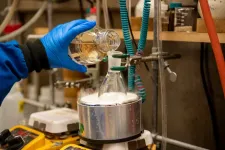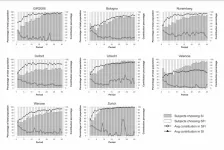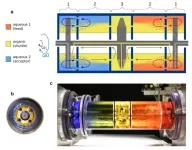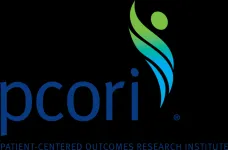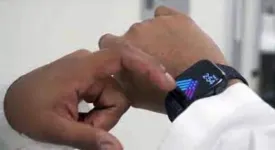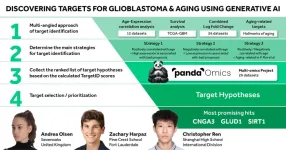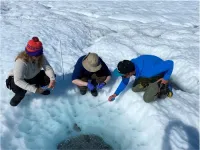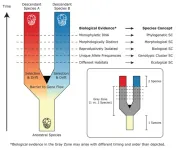(Press-News.org) SAN ANTONIO – May 2, 2023 - Southwest Research Institute (SwRI) and The University of Texas at San Antonio (UTSA) have developed a method to synthesize the highly potent antimalarial drug artemisinin, which could lead to a more cost-effective treatment for malaria. The work, recently featured on the cover of the scientific journal Organic Letters, was supported by the Bill and Melinda Gates Foundation as well as a grant from the Connecting through Research Partnerships (Connect) program, a joint effort by SwRI and UTSA to enhance scientific collaboration between the two institutions.
In 2021, 247 million cases of malaria led to 619,000 deaths worldwide. The most effective malaria treatments utilize the drug artemisinin, which is derived from the sweet wormwood plant, Artemisia annua. However, the process of isolating artemisinin from the plant is time-consuming, and crop yields are susceptible to weather patterns, insect pests and other factors. Despite scientific advancements in treatment methods, the cost of artemisinin still burdens the countries most affected by malaria.
“We were able to develop a novel way of synthesizing artemisinin that mimics how it’s made in nature,” SwRI Senior Research Scientist Dr. Shawn Blumberg said. “Our method mimics the biosynthetic pathway of how artemisinin is made in the plant where it originates, Artemisia annua. We studied the intermediate compounds along that pathway and then used chemistry to create those same intermediates and recreate the pathway.”
In 2020, Blumberg and UTSA Professor Dr. Doug Frantz received a $125,000 grant from the Connect program to build on work supported by the Bill and Melinda Gates Foundation to create a more cost-effective way to synthesize artemisinin.
“There was nothing in public scientific literature that suggested this would work,” Frantz said. “This was challenging chemistry that we were trying to pull off, but we let science tell us where to go. It enabled us to design a process of taking a common intermediate in the biosynthetic pathway for artemisinin and converting it all the way to Artemisinic acid, which is the direct precursor to artemisinin.”
Blumberg and Frantz hope drug companies will take advantage of their work and offer a more potent and cost-effective malaria treatment to the impoverished countries that need it the most, especially considering the inherent risks of drought, wildfire and insects that come with depending on a plant that can only grow in certain parts of the world.
“The supply of artemisinin is still kind of erratic, which causes prices to be erratic as well, and countries dealing with this endemic need a stable, cost-effective solution,” Blumberg said. “While the new process we’ve created might not completely supplant current methods, it can complement other approaches and help to stabilize the world’s supply of artemisinin.”
SwRI’s Executive Office and UTSA’s Office of the Vice President for Research, Economic Development, and Knowledge Enterprise sponsor the collaborative Connect program, which offers grant opportunities to enhance greater scientific collaboration between the two institutions.
For more information, visit https://www.swri.org/industries/pharmaceutical-formulation-development.
END
SwRI, UTSA researchers develop new method to synthesize antimalarial drug
New method could lead to more cost-effective malaria treatments
2023-05-02
ELSE PRESS RELEASES FROM THIS DATE:
ASBMB calls for better wages and benefits for postdocs
2023-05-02
The American Society for Biochemistry and Molecular Biology sent recommendations to the National Institutes of Health on April 14 to improve working conditions for postdocs.
The society recommended that the NIH:
Ensure a livable wage, benefits, etc. for postdocs
Require that principle investigators help postdocs craft a training plan
Require that principal investigators complete mentor training programs
Expand programs to create more academic staff scientist positions
Collect data on postdoc career outcomes
“Many of our members who run labs are struggling to recruit and retain qualified postdocs,” Sarina Neote, public affairs director ...
Cooperation benefits from peer-punishment
2023-05-02
A multi-lab replication of a 2006 study supports the role of peer sanction in promoting human cooperation. Cooperation is imperative for society to successfully solve complex problems, including climate change. One approach many groups have adopted is a system of peer sanctions for noncooperators. Such a system incurs costs to participants, who must impose the sanctions, but can allow cooperators to feel more secure that their investments in the shared project will be matched by others. A 2006 study suggested that groups with peer sanctions outgrew and outperformed groups without a peer-sanctioning institution. In light ...
Recycling of valuable metals from spent lithium ion batteries using spinning reactors
2023-05-02
In a world that is slowly distancing itself from carbon-based energy, there has been a meteoric rise in the use of lithium-ion batteries as a next-generation energy storage solution. However, this has resulted in another problem - an increase in the amount of lithium battery waste. Lithium-ion batteries degrade slowly over their lifetime, losing anywhere from 12% to 24% of their total capacity over 500 charging and discharging cycles. The electrolyte and other materials inside the battery can also degrade, causing a decrease in capacity over time. The disposal of lithium batteries ...
PCORI offers up to $452 million through new health research funding opportunities on high-priority topics
2023-05-02
WASHINGTON, D.C. – The Patient-Centered Outcomes Research Institute (PCORI) today began inviting proposals for new studies and implementation projects through nine funding opportunities. These PCORI Funding Announcements (PFAs) include four offering up to $452 million for comparative clinical effectiveness research (CER) studies comparing health care approaches to help patients and their caregivers make better-informed health choices given their particular circumstances. Additional PFAs offer funding for a range of projects that support and advance patient-centered CER and use of PCORI-funded research results.
“With ...
Could wearables capture well-being?
2023-05-02
New York, NY (May 2, 2023)—Applying machine learning models, a type of artificial intelligence (AI), to data collected passively from wearable devices can identify a patient’s degree of resilience and well-being, according to investigators at the Icahn School of Medicine at Mount Sinai in New York.
The findings, reported in the May 2nd issue of JAMIA Open, support wearable devices, such as the Apple Watch®, as a way to monitor and assess psychological states remotely without requiring the completion of mental health questionnaires.
The ...
High school student researchers find new brain tumor drug targets using AI
2023-05-02
Three high school students – Andrea Olsen from Oslo, Norway; Zachary Harpaz from Boca Raton, Florida; and Chris Ren from Shanghai, China – co-authored a paper using a generative artificial intelligence (AI) engine for target discovery from Insilico Medicine (“Insilico”) called PandaOmics to identify new therapeutic targets for glioblastoma multiforme (GBM). GBM is the most aggressive and common malignant brain tumor, accounting for 16% of all primary brain tumors. The findings were published on April 26 in the journal Aging.
Olsen, a student at Sevenoaks School in Kent, UK, began interning at Insilico Medicine in 2021, after discovering ...
More than 5,000 tons of toxic chemicals released from consumer products every year inside homes and workplaces
2023-05-02
People often assume that the products they use every day are safe. Now a new study by Silent Spring Institute and University of California, Berkeley exposes how much people come into contact with toxic ingredients in products, used at home and at work, that could harm their health. Findings from the analysis could help state and federal agencies strengthen chemical regulations and guide manufacturers in making safer products.
Many common products like shampoos, body lotions, cleaners, mothballs, and paint removers contain toxic volatile organic compounds or VOCs—chemicals that escape as gases, accumulate in indoor air, and cause a variety of health ...
Researchers discover that the ice cap is teeming with microorganisms
2023-05-02
There are no plants, and only very few animals: people rarely come here. The large glaciers in Greenland have long been perceived as ice deserts. Gigantic ice sheets where conditions for life are extremely harsh.
But now, it seems, we have been wrong. There is much more life on the glaciers than we thought.
Headed by Professor Alexandre Anesio, a group of researchers from the Department of Environmental Science at Aarhus University have discovered that the glaciers are teeming with life. Microbes that have adapted to ...
Behavior patterns of people who achieve clinically significant weight loss
2023-05-02
COLUMBUS, Ohio – A new study analyzing data on over 20,000 U.S. adults links a healthier diet and increased exercise to weight loss that reduces heart disease risk – while associating skipping meals and taking prescription diet pills with minimal weight loss, weight maintenance or weight gain.
For many in the study sample, however, losing a “clinically significant” 5% of their body weight did not eliminate their risk factors for cardiovascular disease, results showed. In fact, the average ...
Accelerating coral reef science: building consensus around the assessment and interpretation of Symbiodiniaceae diversity
2023-05-02
New research published in PeerJ Life and Environment by Dr. Sarah Davis and sixty-one scientists from 12 countries presents a perspective to build consensus around the assessment and interpretation of Symbiodiniaceae diversity. Symbiodiniaceae is a family of marine dinoflagellates (plankton) notable for their symbiotic associations with reef-building corals, sea anemones, jellyfish, marine sponges and other marine invertebrates. Understanding Symbiodiniaceae is important to those working to protect and regenerate coral reefs that are under threat around the world.
"The authors hope this paper will provide a springboard to launch ...
LAST 30 PRESS RELEASES:
Chimps’ love for crystals could help us understand our own ancestors’ fascination with these stones
Vaginal estrogen therapy not linked to cancer recurrence in survivors of endometrial cancer
How estrogen helps protect women from high blood pressure
Breaking the efficiency barrier: Researchers propose multi-stage solar system to harness the full spectrum
A new name, a new beginning: Building a green energy future together
From algorithms to atoms: How artificial intelligence is accelerating the discovery of next-generation energy materials
Loneliness linked to fear of embarrassment: teen research
New MOH–NUS Fellowship launched to strengthen everyday ethics in Singapore’s healthcare sector
Sungkyunkwan University researchers develop next-generation transparent electrode without rare metal indium
What's going on inside quantum computers?: New method simplifies process tomography
This ancient plant-eater had a twisted jaw and sideways-facing teeth
Jackdaw chicks listen to adults to learn about predators
Toxic algal bloom has taken a heavy toll on mental health
Beyond silicon: SKKU team presents Indium Selenide roadmap for ultra-low-power AI and quantum computing
Sugar comforts newborn babies during painful procedures
Pollen exposure linked to poorer exam results taken at the end of secondary school
7 hours 18 mins may be optimal sleep length for avoiding type 2 diabetes precursor
Around 6 deaths a year linked to clubbing in the UK
Children’s development set back years by Covid lockdowns, study reveals
Four decades of data give unique insight into the Sun’s inner life
Urban trees can absorb more CO₂ than cars emit during summer
Fund for Science and Technology awards $15 million to Scripps Oceanography
New NIH grant advances Lupus protein research
New farm-scale biochar system could cut agricultural emissions by 75 percent while removing carbon from the atmosphere
From herbal waste to high performance clean water material: Turning traditional medicine residues into powerful biochar
New sulfur-iron biochar shows powerful ability to lock up arsenic and cadmium in contaminated soils
AI-driven chart review accurately identifies potential rare disease trial participants in new study
Paleontologist Stephen Chester and colleagues reveal new clues about early primate evolution
UF research finds a gentler way to treat aggressive gum disease
Strong alcohol policy could reduce cancer in Canada
[Press-News.org] SwRI, UTSA researchers develop new method to synthesize antimalarial drugNew method could lead to more cost-effective malaria treatments
